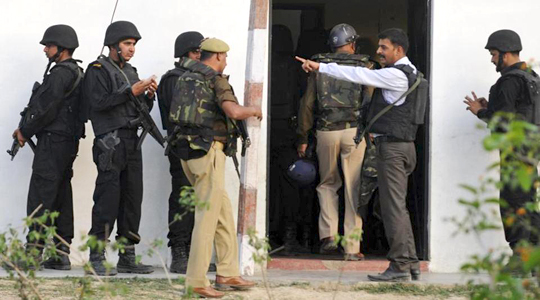Lucknow, Mar 8:A suspected militant’s body was recovered after an anti-terror operation that lasted nearly 12 hours on the outskirts of Lucknow in Uttar Pradesh, police said early on Wednesday.

ADG Daljit Chaudhary said earlier reports of two militants -- who were allegedly linked to a blast in a Bhopal-Ujjain passenger train on Tuesday -- holed up in the house were false.
“The suspect was found dead with weapons inside the house. During the operation, it was felt at one point of time that there was more than one person, but it is confirmed that there was only one man. The operation stands closed and now the rest of the legal formalities will take place,” Chaudhary said, adding that the encounter ended around 3am on?Wednesday.
Uttar Pradesh anti terror squad (ATS) inspector general Aseem Arun said the militant was a member of the Indian module of the Islamic State (IS) terrorist group called Khorasan.
“We got the intelligence from a sister agency that a person named Saifullah affiliated to IS is hiding in a residential area in Lucknow,” Arun said.
Ammunition, including eight automatic pistols, live cartridges and some explosives, and an IS flag were recovered from the site of the encounter.
The ATS reached the cleric’s house in a thickly-populated locality on the outskirts of Lucknow around 2pm after specific inputs about militants linked to the Madhya Pradesh train blast.
The commandos came under a volley of fire when they moved in, forcing the officers to use stakeout and stealth to get close to the militants. They were not sure how many men were in the house adjoining a mosque.
The commandos thought a lone gunman was involved, but a micro-camera drilled through the roof revealed the presence of another man.
The explosion near Kalapipal, around 80km west of Bhopal, in the train’s last coach left at least 10 passengers wounded. Among them were two teenage girls and two women.
Initially thought to be a tube-light burst, investigators found later that it was a low-intensity pipe bomb, an improvised explosive device (IED) that went off when it was being shipped possibly to a location in UP, where the final round of assembly polls are due on Wednesday.
Madhya Pradesh inspector general (law and order) Makrand Deouskar said ammonia nitrate was used in the bomb that exploded around 8.50am.
MP police zeroed in on four men from CCTV footage at Bhopal railway station. They were picked up from Pipariya in Hoshangabad district earlier.
These men are from Aligarh and Kanpur in UP. They apparently named their comrades — Saiful of Lucknow, and 18-year-old Faizan, Imran and Azhar of Kanpur. Police arrested Faizan and Imran, and confiscated a laptop that allegedly revealed they were members of the state’s IS cell.
The computer contained an elaborate plan to carry out blasts at Deva Shareef, the shrine of Sufi saint Waris Ali Shah, on March 27, police said.
Third suspect Azhar escaped. He owns a mobile shop in Kanpur’s Rahmani Market, an officer said.
Apart from the shrine’s layout, jihadi videos of attacks on religious places in Pakistan were allegedly found in the laptop. The IS is said to be involved in a suicide attack on the packed shrine of Shahbaz Lal Qalandar in Pakistan in February, which killed 80 people.
The Centre sounded an alert across the country in the wake of the MP train blast and shootout with militants in Lucknow.
Union home minister Rajnath Singh rang up UP director general of police Javeed Ahmed to take stock the operation.
“We are alert. We have sounded an alert across the country,” junior home minister Hansraj Ahir said on Tuesday.
About 300 police personnel, including ATS commandos, were engaging the militant in Lucknow’s Kakori area. Another posse has formed a picket to stop people from getting near the site.
A Satish Ganesh, IG, Lucknow Range, said the militant was asked to surrender, but he responded saying he would rather attain “martyrdom”.
“He has at least two small automatic weapons,” he said.
Police lit flashlights to keep the area well-illuminated to stop the militants from escaping. The power distribution agency was asked to ensure continuous electricity supply.








Comments
Add new comment